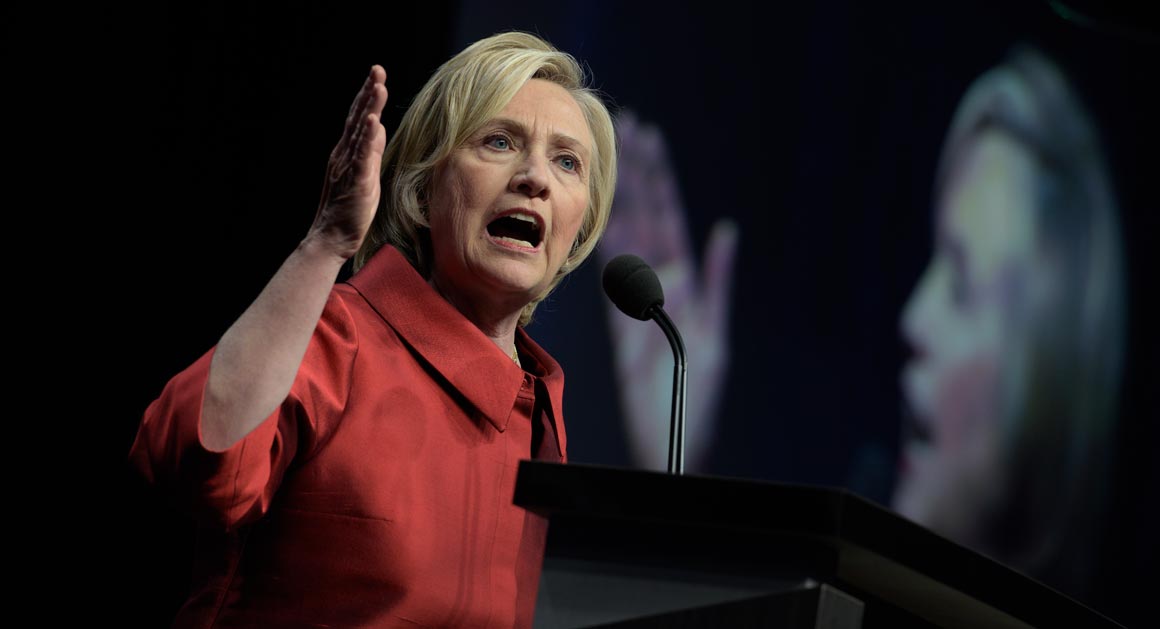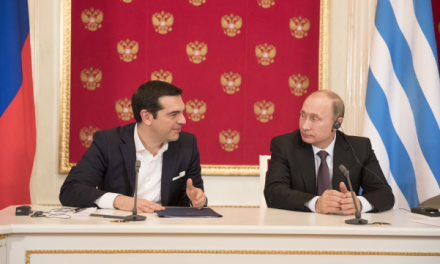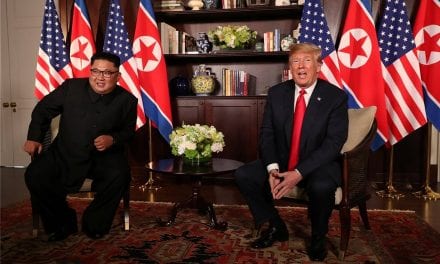By INDIRA A.R. LAKSHMANAN
I covered her as a candidate, and then as secretary of state—and it was like two totally different people.
llary Clinton knows her biggest weakness as a candidate is that she’s not much of one. She works hard at it, but she’s not in her element doing the things that presidential contenders need to do: performing in arenas, charming the media, electrifying the masses. “I’m not a natural politician,” Clinton confessed at a recent debate. “In case you haven’t noticed.”
People have noticed. Bernie Sanders, who does know how to fire up a crowd, has won seven of the past eight states and is looking for a dramatic primary upset in his native New York on Tuesday. Like the golden-tongued newcomer named Barack Obama who took Clinton by surprise eight years ago, Sanders’ shockingly successful insurgency is a nagging reminder of Clinton’s vulnerability as a campaigner. And it’s plainly on her mind. At a recent town hall, Clinton spoke admiringly, even wistfully, of two guys who had millions in their thrall with their rhetorical flourish and knack for engaging ordinary folk. “I watched my husband campaign, I watched President Obama campaign – it is poetry … That’s not necessarily my forte,’’ she confessed.
What is her strong suit, Clinton says, is the nitty-gritty prose of governance. That’s when she truly finds herself. “I’m much better when I actually have a job to do, rather than trying to get the job, you know?’’ she said at the town hall. In a recent interview, she elaborated on the point, saying her effectiveness translates into likability: “When I have a position, whether it’s first lady or senator or secretary of state and I’m doing the work, I’m really quite popular,” she said, citing high approval ratings as secretary. Her pitch boils down to a trust fall for American voters: You might not see it now, but if you elect me, I’ll be the president who inspires you with what I get done.
Can she really sell that to the American people? Over the past nine years I’ve had a unique vantage point on this question. Covering her for Bloomberg News, I traveled with her both on her last campaign and as secretary of state. In 2007 and 2008, I trailed Candidate Clinton from Iowa to Kentucky, watching her bristle at questions and struggle to inspire crowds. I was standing a few feet from her when she let down her guard in a rare moment, her voice cracking and tears welling in her eyes at a New Hampshire coffee shop. After the election, I was the only writer from that pack who joined the much-smaller State Department press corps, and traveled regularly on her plane for the next four years, from her first overseas trip to Asia to her last stop in Belfast.
Watching her on those two different stages, the contrast between the two Hillarys was stunning. Up close, it felt like The Invasion of the Body Snatchers. From the start of her first trip as secretary of state in February 2009, I was struck by how different she seemed from the presidential candidate she had been only several months before. Clinton was relaxed, at ease with the press and radiating charisma in front of crowds. In Indonesia, thousands of people crammed into a Jakarta slum, all wanting to touch her or catch a glimpse as she greeted new mothers at a maternal health clinic. A member of her American security detail joked privately that if she’d gotten this kind of reception at home, the U.S. election might have turned out differently. When I asked a couple of bystanders why they’d waited hours for a glimpse of a U.S. Cabinet secretary, they looked at me as if I were a moron: “She’s the most famous and powerful woman in the world. Who wouldn’t want to see her?”
She also played the crowds like a natural. I still chuckle at a moment in her second overseas town hall that same trip when a young woman at Ewha Womans University in Seoul asked breathlessly: “I have a question related to love … How did you know your husband was … ” The end of her question was at first inaudible, and for a split second, the American reporters and aides held their breath, wondering at the implication. But the student had asked how Clinton knew her husband was the right one for her, and Clinton exclaimed with a girlish laugh that she felt “more like an advice columnist than like the secretary of state today.” She then launched into an impromptu meditation on love, describing her husband as her best friend and their marriage as “an endless conversation.” She quoted a close friend who told her at the end of her life, “I’ve loved and been loved, and all the rest is background music.” The Korean students cheered her answer, and I was struck that it felt so much more personal and revelatory than almost any moment in Clinton’s campaign.
What happened to the Candidate Clinton who was stiff, defensive and off-putting? Her doppelganger, Secretary Hillary, seemed to have shed a mask. It wasn’t just that Clinton was good at policy stuff as secretary of state; she actually came alive on the job—meeting people and connecting with their problems, making speeches and working crowds. For those four years, she earned consistently high approval ratings from the American public and won praise from the same Senate Republicans who rail against her now. Setting aside judgments about ideology and policy, achievements or failures, it’s striking that the personal political skills that were obscured in her previous campaign—charisma and an ability to connect with and persuade people—were Clinton’s tools of the trade when she traveled as Obama’s envoy to win over votes in support of U.S. foreign policy.
Clearly, however, something seems to happen to Clinton when the task is asking people to vote for her. One can pop-psychologize: Maybe it’s a byproduct of a self-effacing Midwestern Methodist upbringing, or a fear of failure and a defensive instinct instilled by a father who was demanding and hypercritical. David Axelrod, who as chief strategist for Obama’s 2008 presidential campaign studied her vulnerabilities as a candidate, has his own theory: Campaigns for president, unlike those for senator, demand a level of “revelation about yourself, about who you are as a person, and she’s very cautious about that. Part of it is she’s been beaten up for a long time and that accentuates her fear of making a mistake.”
She’s hardly the first candidate to be reticent about her personal side. George H.W. Bush, also a very reserved person, was a less-than inspiring campaigner but a largely effective leader, especially in foreign policy. Likewise, Lyndon B. Johnson was “at best a prosaic campaigner,” but used skills honed over years in Congress to pass transformational new laws, presidential historian Michael Beschloss told me.
This year, Clinton’s lead in the 2016 primaries and caucuses suggests she’s studied what she did wrong in her last race. She’s made an effort this time to open up to voters in a way that Americans crave from their leaders—referring to her faith, to obstacles women face, to her mother’s influence in her life, to problems in her marriage, and appearing on comedy shows early in the campaign to showcase her humorous side.
But Sanders’ 12-point win over Clinton in Wyoming, following his strong showing elsewhere in the past several contests, is an indicator that for many voters, Clinton is still not catching fire. That’s a warning sign ahead of New York’s primary, which Clinton needs to win decisively to halt Sanders’ momentum, and it’s a red flag for the general election.
If she secures the Democratic nomination as expected, her weaknesses as a political performer will be even more pronounced if she’s pitted against a Republican front-runner who compensates for what he lacks in governing expertise by thrilling crowds with a no-holds-barred, reality-TV intensity. If Clinton the candidate is a guarded policy wonk who lacks an electrifying public persona, Donald Trump is her photo negative. The general election will put her weakest quality as a politician to its hardest test yet.
***
Covering Hillary Clinton in 2008 wasn’t the happiest assignment for a reporter. News conferences were few and tense, and it’s hard to remember an off-the-record or candid conversation she had with campaign reporters. Burned by years of critical coverage dating back to her husband’s run in 1992, she and her staff seemed to dislike and distrust the press, rarely venturing to the back of her plane to chat. Some of her key advisers were unhelpful, even downright hostile.
Her unhappy history with Republican attacks and media coverage of controversies from Whitewater to Monica Lewinsky was an understandable explanation for her defensive posture. But it translated into a reluctance to go off-script and expose herself to the public, which made for a strained relationship with voters as well. As she traveled from Iowa to New Hampshire to the Super Tuesday states, her speeches often felt dry and canned. Facing off against the historic candidacy of a gifted African-American orator, she talked policy and neglected inspiration. She downplayed the historic nature of her own candidacy as a woman, stressing toughness and readiness when Americans wanted something new. Young people and minorities flocked to the change that Obama represented.
At campaign stops, voters pressed her over her support as a senator for the ill-fated military intervention in Iraq. Instead of disavowing her vote like her early rival John Edwards did, she defended it, turning off a large segment of Democrats. She also exuded hubris, which didn’t help; she told ABC’s George Stephanopoulos in an interview before Iowa caucused that she would have the nomination in the bag by February 5.
In her campaign’s view, the media bore much of the blame for focusing on gotcha moments instead of substantive issues, and her aides frequently complained that the press was much harder on her than on Obama. They were right about that, though it may have been partly because of her poor relationship with the press and partly that she had a longer record to dissect. Yet if she had won over enough voters, critical coverage would hardly have mattered. Consider Trump: The candidate and his campaign are criticized and mocked daily by the media, but he continues to electrify his base and dominate the Republican race.



















